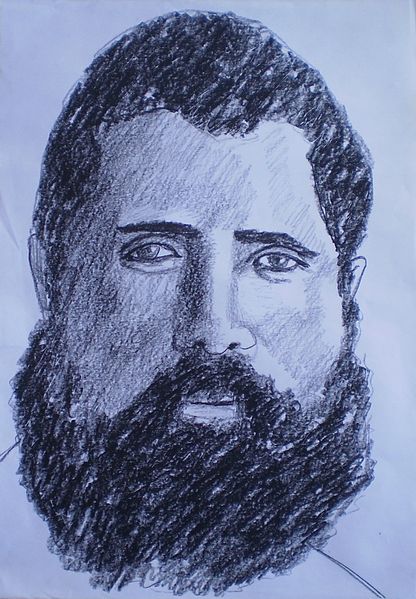Born in a Ukrainian shtetl in 1881, Yosef Haim Brenner is considered a pioneer of Modern Hebrew literature. He grows up in a poor, traditional family, but abandons his religious education to affiliate with the secular Jewish Socialist Bund Movement, earning a living teaching Hebrew. One year after publishing his first book, a collection of stories entitled Me-‘Emek ‘akhor (From the Murky Depths), Brenner is drafted to the Russian army in 1901. He serves for three years and during his conscription he broadens his knowledge of Russian literature and other secular subjects. In 1904, he illegally deserts the army and flees to England, where he will live until 1908. In London, he writes in Hebrew and Yiddish, and creates a literary journal, Ha-Me‘orer (Awakening) .
In London, both his writing and viewpoint grow increasingly at odds with the leading cultural Zionist, Ahad Ha’am. While Ha’am advocates for cultural development emanating from a spiritual center in the Land of Israel, built on Hebrew and Jewish religious traditions, Brenner advocates for Jewish salvation through labor as part of an abandonment of the old world way of Jewish living.
He leaves London in 1908, and after spending a year in L’viv (Today in Ukraine, then a part of Poland), moves to Palestine in 1909. After working as a laborer, he eventually becomes a teacher at the prestigious Herzliya Gymnasium in addition to writing, editing and translating. At different points, he lives in Tel-Aviv, Haifa and Jerusalem. He is among the founders of the Histadrut, Labor Federation.
In 1921, Brenner moves to the Abu Kabir neighborhood on the outskirts of Jaffa to focus on his writing. On May 1, violence erupts between Jews and Arabs in Jaffa and quickly spreads to areas outside the city. Brenner refuses to flee, and the following day, May 2, he is murdered along with five others.
Israeli historian, Anita Shapira writes in the prologue to her 2014 biography of Brenner, “He is admired as a writer and cultural leader by religious and secular people alike—and even more so as a person who laid down norms for a society that had lost its moral compass. He was a man of contrasts: skeptical of Zionism and loyal to the Land of Israel, the country where he wanted to raise his son and where he was killed; he possessed the boundless pessimism of a realist who unblinkingly observes realists and also the latent optimism of a man who irrationally claims that ‘despite everything’ the Jews’ will to live will prevail; he epitomized the love of man, the willingness to help anyone in need, and also the terrible awareness of the shortcomings of the human race in general and those of his people in particular.”
The photo shows a drawing of Yosef Haim Brenner done by Israeli actor Chaim Topol. Photo source: Wikimedia Commons, Public Domain.









